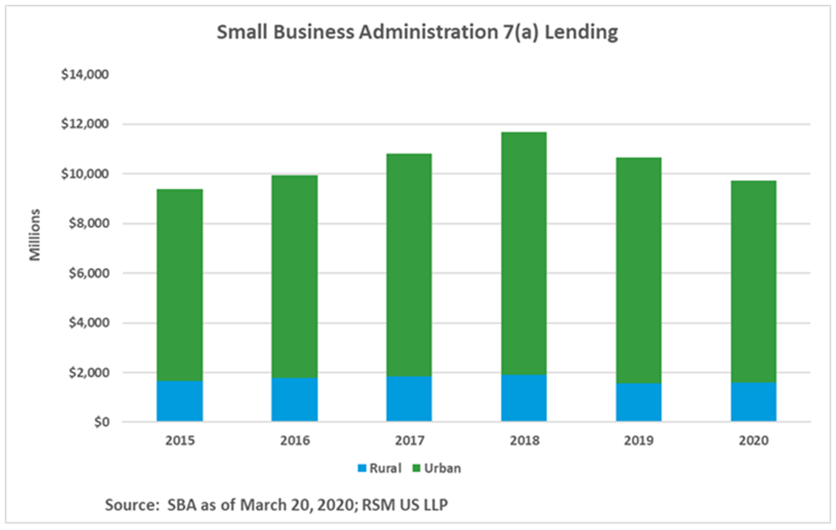But lenders must first be approved by the SBA. While many established financial institutions are already approved and can participate, there are many new lenders that will need to apply.
What follows is a guide to help lenders navigate the program, with information from the SBA.
Who is eligible to lend?
Only lenders certified by the Small Business Administration, but all federally insured depository institutions, federally insured credit unions and Farm Credit System institutions are eligible. The SBA is welcoming new participants to apply as lenders.
The guidance from the SBA will be reviewed closely by nonbank lending companies. The text reads, “Any depository or non-depository financing provider that originates, maintains, and services business loans or other commercial financial receivables and participation interest.” These companies may qualify as a non-depository financing provider if they meet all the lending requirements.
Which SBA forms should a potential lender complete?
A lender looking to participate in the SBA 7(a) program will need to review the information below. Please consult your local SBA office as well as legal counsel during this process because information changes at any moment.
For lenders that are federally insured depository institutions, federally insured credit unions, and farm credit system institutions (other than the Federal Agricultural Mortgage Corporation), they will need to complete SBA Form 3506. Completion of this form is required for those who have no history with SBA loan programs but want to apply to participate in the PPP program.
Lenders will need to submit their completed application to DelegatedAuthority@sba.gov to apply. In addition, the following guidance was provided by the SBA.
- Please do not use secure email. They cannot open them.
- Please ensure that the CARES Act Section 1102 Lender Agreement (SBA Form 3506) is completed in its entirety, witnesses have signed (bank seal on the document is not necessary but is helpful), and please do not overlook the need to attach an “Incumbency Certificate.”
For all other lenders, the Treasury Department released new guidance on April 9 on how to become a qualified lender for this loan program. Here is the application and directions are on the last page of the form. Interested lenders will need to submit their completed application to NFRLApplicationForPPP@sba.gov.
Are lenders required to use a promissory note provided by the SBA?
Lenders may use their own promissory note or an SBA form of promissory note.
Are the loans guaranteed by the SBA, and are there fees?
Yes, the loans are fully guaranteed. A lender does not need a separate SBA authorization for the SBA to guarantee a PPP loan. But lenders must have executed SBA Form 2484 to issue PPP loans and receive a loan number for each originated loan. The decision not to require a separate SBA authorization in order to ensure that these loans are disbursed as efficiently as practicable. There are no guaranty fees, including upfront and annual servicing fees.
What underwriting is required?
Lenders must verify that a borrower was in operation on February 15, 2020, and had employees for whom the borrower paid salaries and payroll taxes. Lenders must verify the dollar amount of average monthly payroll costs. Lenders must follow applicable Bank Secrecy Act requirements.
How will lenders be compensated?
Processing fees will be based on the balance of the financing outstanding at the time of final disbursement:
- Loans $350,000 and under: 5.00%
- Loans greater than $350,000 to $2 million: 3.00%
- Loans greater than $2 million: 1.00%
Lenders may not collect any fees from the applicant.
Who can be an agent?
An agent is an authorized representative and can be:
- An attorney
- An accountant
- A consultant
- Someone who prepares an applicant’s application for financial assistance and is employed and compensated by the applicant
- Someone who assists a lender with originating, disbursing, servicing, liquidating or litigating SBA loans
- A loan broker
- Any other individual or entity representing an applicant by conducting business with the SBA
How will agents be compensated?
Agent fees will be paid out of lender fees. The lender will pay the agent. Agents may not collect any fees from the applicant.
- Loans $350,000 and under: 1.00%
- Loans greater than $350,000 to $2 million: 0.50%
- Loans greater than $2 million: 0.25%
Can these loans be sold in the secondary market?
Yes, PPP loans can be sold in the secondary market. The SBA will not collect any fee for any guarantee sold into the secondary market.
The takeaway
Lenders looking to expand their client base while providing guaranteed loans that offer lower rates and longer terms should consider becoming an SBA lender. As benefits of the CARES Act are pushed to struggling Americans and businesses, it is important for lending participants to help the SBA during the implementation phase of the law.
This article was originally published on April 1, 2020 and was recently updated on May 5, 2020


